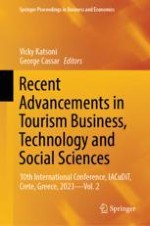2024 | OriginalPaper | Buchkapitel
To Stay or to Go! Exploring the Impact of Turnover Intention, Retention Strategies and Employee Surveys on Tourism Employee Retention in Zimbabwe
verfasst von : Barbara Mutadzakupa, Magdalena Petronella Swart, Ciné van Zyl
Erschienen in: Recent Advancements in Tourism Business, Technology and Social Sciences
Verlag: Springer Nature Switzerland
Aktivieren Sie unsere intelligente Suche, um passende Fachinhalte oder Patente zu finden.
Wählen Sie Textabschnitte aus um mit Künstlicher Intelligenz passenden Patente zu finden. powered by
Markieren Sie Textabschnitte, um KI-gestützt weitere passende Inhalte zu finden. powered by
